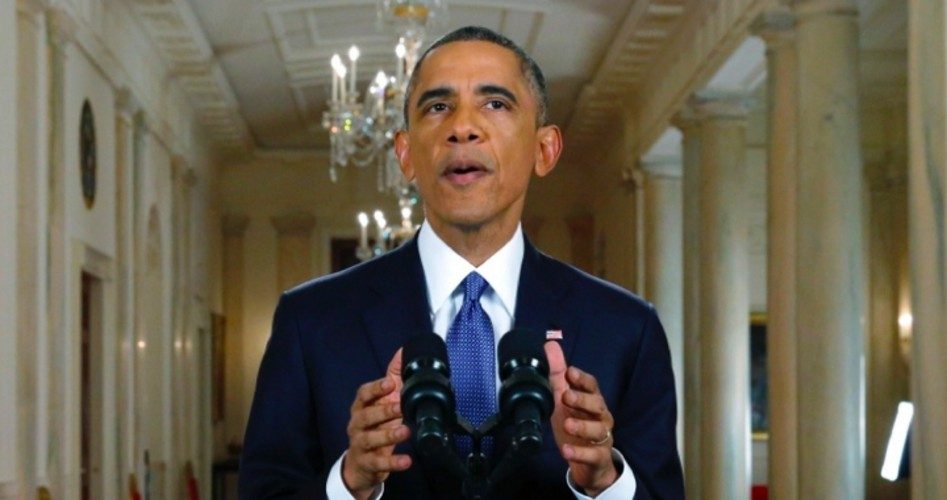
First, on February 16, U.S. District Judge Andrew Hanen issued an junction blocking President Obama’s executive action to grant amnesty to four million illegal aliens. Then, on November 9, U.S. Court of Appeals for the Fifth Circuit in New Orleans upheld Hanen’s injunction. So Obama is stymied, right? Wrong, the administration has continued to act on other executive actions not covered by the court decision. These executive actions protect more than 80 percent of illegal immigrants from deportation, according to a November 19 report in the Washington Times.
Obama unveiled his plan in a White House speech one year ago, as we write, on November 20, 2014. He did not deliver any surprises as he explained his plan to use executive action to grant protection from deportation to millions of illegal immigrants. Two groups of illegal aliens would qualify: Those who have been in the United States for more than five years; and those who have children who are American citizens or legal residents.
The president promised those who fit his criteria: “If you register, pass a criminal background check, and you’re willing to pay your fair share of taxes — you’ll be able to apply to stay in this country temporarily, without fear of deportation. You can come out of the shadows and get right with the law.”
ABC News reported after the announcement that those who qualified for deferred action through a son or daughter who is a U.S. citizen would receive immediate amnesty from deportation.
Almost simultaneous with Obama’s announcement, Homeland Security (DHS) Secretary Jeh Johnson issued a memorandum (with the lengthy title: “Exercising Prosecutorial Discretion with Respect to Individuals Who Came to the United States as Children and with Respect to Certain Individuals Who Are the Parents of U.S. Citizens or Permanent Residents”) outlining the administration’s Deferred Action for Parents of Americans and Lawful Permanent Residents (DAPA) program.
The memorandum expanded DACA (Deferred Action for Childhood Arrivals), which was initiated in 2012 by a policy memorandum sent from former DHS Secretary Janet Napolitano. The memorandum removed DACA’s age cap and extended work authorization to three years. Johnson’s order also expanded “deferred action” (another name for amnesty) by stating:
I hereby direct USCIS [United States Citizenship and Immigration Services] to establish a process, similar to DACA, for exercising prosecutorial discretion through the use of deferred action, on a case-by-case basis, to those individuals who:
• have, on the date of this memorandum, a son or daughter who is a U.S. citizen or lawful permanent resident;
• have continuously resided in the United States since before January 1, 2010;
• are physically present in the United States on the date of the memorandum, and at the time of making a request for consideration of deferred action with USCIS.
Seeking to block that memorandum, 26 states led by Texas filed a suit (State of Texas, et al v. United States of America, et al.) in the U.S. District Court for the Southern District of Texas in Brownsville. U.S. District Judge Andrew S. Hanen of that court issued an order of temporary injunction on February 16, blocking the federal government from implementing the plan.
In his opinion Hanen castigated Homeland Security for its non-enforcement of existing immigration law. He wrote:
The DHS was not given any “discretion by law” to give 4.3 million removable aliens what the DHS itself labels as “legal presence.” In fact, the law mandates that these illegally-present individuals be removed. The DHS has adopted a new rule that substantially changes both the status and employability of millions. These changes go beyond mere enforcement or even non-enforcement of this nation’s immigration scheme.
The administration appealed the decision to the U.S. Court of Appeals for the Fifth Circuit in New Orleans, which recently upheld Hanen’s injunction. The day after that ruling, on November 10, Justice Department spokesman Patrick Rodenbush announced: “The department disagrees with the 5th Circuit’s adverse ruling and intends to seek further review from the Supreme Court of the United States.”
Hanen’s injunction pertains to only one part of last November’s memorandum issued by the Obama administration, however. The Washington Times noted that remaining actions that Obama announced on November 20, 2014 are still advancing, continuing a reassessment of “priorities” that effectively order immigration authorities to not deport most illegal aliens.
“There are 7 or 8 or 9 million people who are now safe under the current policy. That is a victory to celebrate while we wait for the Supreme Court,” the Times quoted Rep. Luis V. Gutierrez (D-Ill.) as saying — a leading advocate of amnesty who encouraged Obama to circumvent Congress and take unilateral action last year.
Obama has defiantly denied, as he did in his speech last year, that what his administration is implementing is amnesty for illegal aliens. Anticipating that opponents would call it what it is, he said:
This deal does not apply to anyone who has come to this country recently. It does not apply to anyone who might come to America illegally in the future. It does not grant citizenship, or the right to stay here permanently, or offer the same benefits that citizens receive — only Congress can do that. All we’re saying is we’re not going to deport you. [Emphasis added.]
I know some of the critics of this action call it amnesty. Well, it’s not. Amnesty is the immigration system we have today — millions of people who live here without paying their taxes or playing by the rules, while politicians use the issue to scare people and whip up votes at election time.
Semantic gymnastics aside, if the federal government tells illegal aliens who should be deported according to our immigration law that it will not deport them, then that promise is amnesty. Immediately after his speech, two senators who are now presidential candidates took him to task.
“[The president’s] actions are not only unconstitutional and in defiance of the American people who said they did not want amnesty in the 2014 elections, but they are also unfair to every immigrant who has come to our nation legally,” SenatorTed Cruz (R-Texas) posted on his Facebook profile.
Senator Rand Paul (R-Ky.) said he “will not sit idly by and let the President bypass Congress and our Constitution.”
“President Obama is not above the law and has no right to issue executive amnesty. His actions blatantly ignore the separations of powers and the principles our country was founded on. The President has said 22 times previously that he does not have the power to legislate on immigration,” Paul said in a statement.
Photo of President Obama: AP Images
Related articles:
Obama Admin. to Appeal to Supreme Court on Immigration Executive Action
Appeals Court Upholds Judge’s Injunction Against Obama Amnesty for Illegals
Obama Administration Planning to Circumvent Judge’s Order Against Amnesty
Judicial Watch Asks FEC to Investigate DNC for Hiring Illegal Alien
Obama DACA Program Grants Amnesty to 664,607 Illegal Aliens
Judge Hanen Sets August 19 Hearing for DHS Officials to Avoid Contempt Charges
Judge Hanen Reprimands Feds for Violating Order Against Executive Amnesty
U.S. Judge in Texas May Order Sanctions If Obama Justice Dept. Misled Him
Appeals Court Lets Stand Injunction Against Obama Amnesty
After Judge Refuses to Lift Anti-amnesty Injunction, All Eyes Turn to New Orleans
Obama DOJ Appeal of Federal Judge’s Injunction Set for April 17
Obama Administration Appeals Ruling Blocking Immigration Amnesty Program
Judge Delays on Obama Request for Stay of Immigration Order Ruling
Obama Administration Asks Judge to Expedite Consideration of Immigration Order Stay
Obama Immigration Amnesty Action Is on Hold as Appeals Are Planned
Federal Judge Stops Obama Executive Action Amnesty
More States Suing Feds Over Immigration Executive Orders
States Sue Obama Administration Over Executive Order on Immigration



